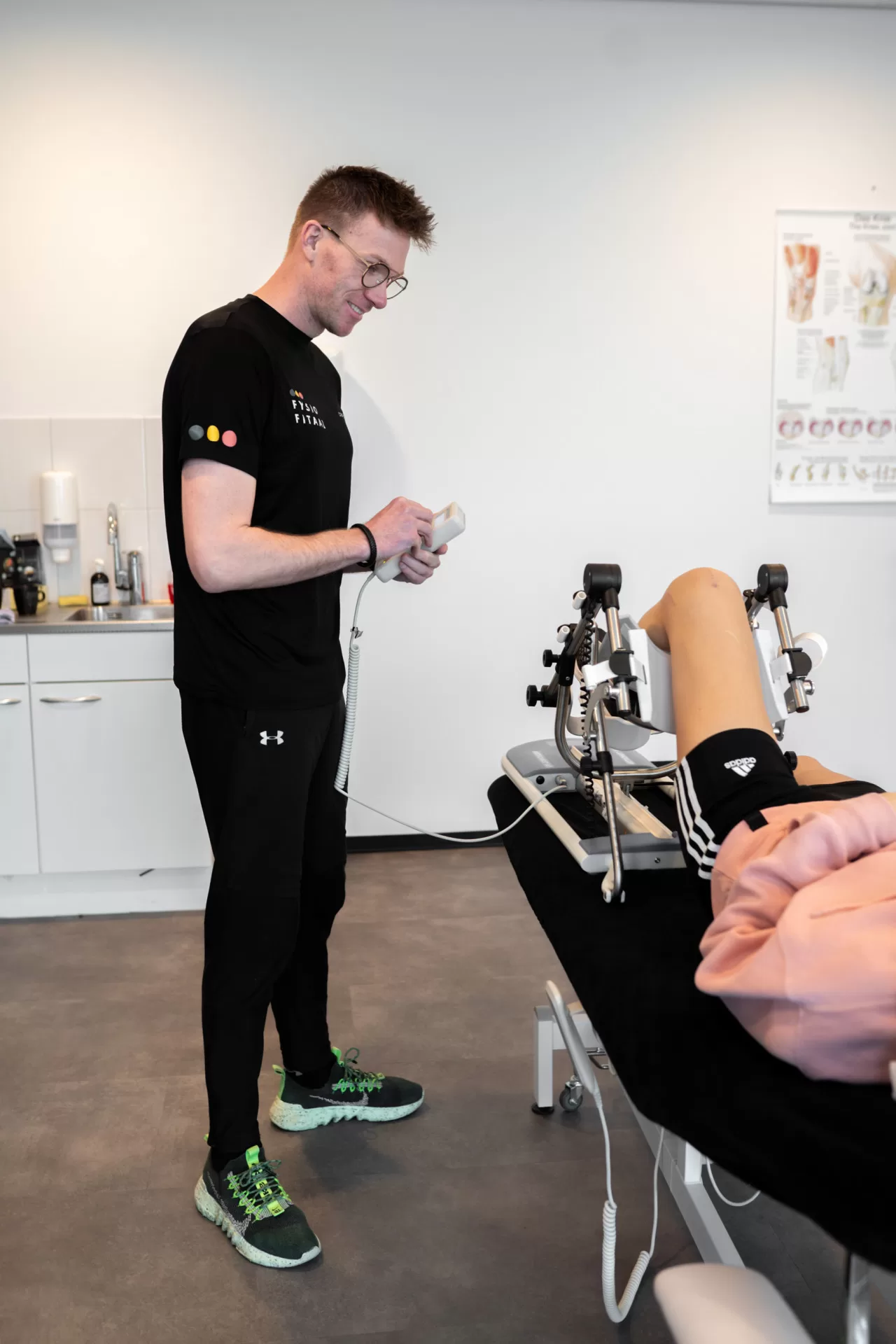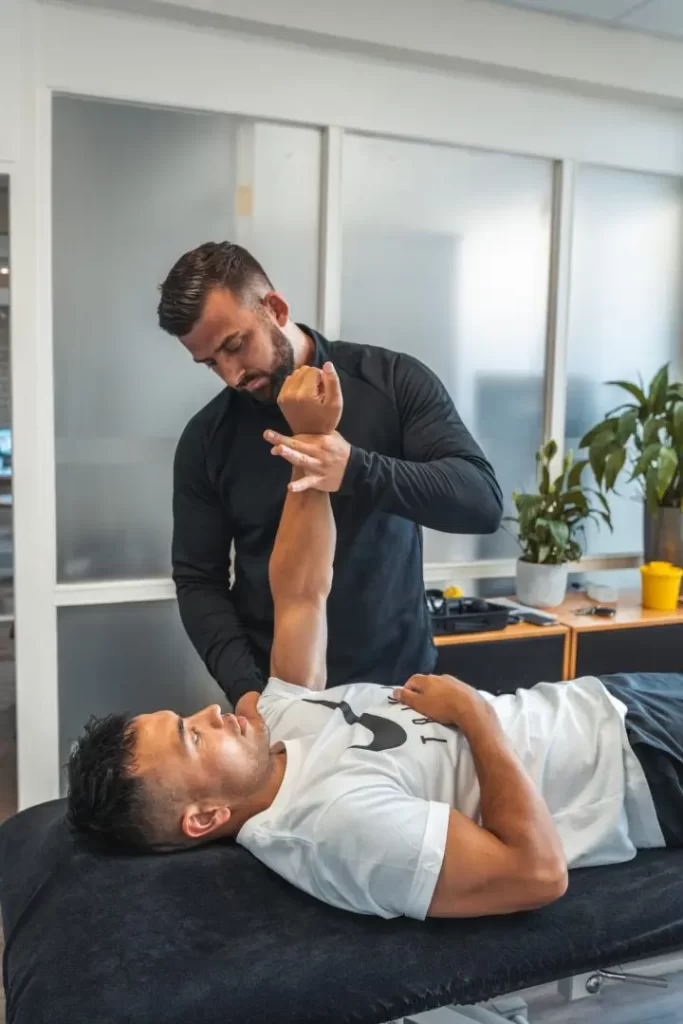Tibia plateau fracture rehabilitation
A tibia plateau fracture is a serious knee injury in which the tibia breaks just below the knee joint. After surgery, proper rehabilitation is essential to regain knee function and prevent complications such as stiffness, muscle weakness and instability. At Physio Fitaal in Tilburg we guide you step by step through this process, so that you recover safely and effectively.
In the first phase, the focus is on reducing swelling, improving mobility and teaching correct loading. Once the knee has recovered sufficiently, we work on strength, stability and coordination. We make sure you can move smoothly again and, if necessary, guide you towards full sports rehabilitation.
At Physio Vital we tailor treatment to your specific situation and goals. We work with a targeted plan so that you can recover with confidence and resume your daily activities without limitations. Do you have questions or want to start physiotherapy? Feel free to contact us!

Origination mechanism
A tibia plateau fracture occurs when a strong force is applied to the upper part of the tibia. This can happen due to a direct impact, such as a fall on a bent knee or an accident that puts a lot of force on the lower leg. Sports injuries, such as a hard collision in football, skiing or motocross, can also cause this fracture.
Traffic accidents - In a collision, the knee can hit the dashboard hard, causing a fracture in the tibia.
Sports injuries - Contact and high-impact sports such as football, skiing and mountain biking increase the risk due to sudden forces on the knee.
Falls - An unfortunate fall, such as from a staircase or while playing sports, can lead to a fracture when the full weight lands on the knee.
The severity of the fracture depends on the force and angle of impact. Sometimes the fracture remains stable, but in more severe cases, the bone may move, requiring surgery to realign the knee. After surgery, physiotherapy is essential to restore knee strength and stability. At Physio Fitaal Tilburg we guide you through this process step by step.
Risk factors
A tibia plateau fracture is caused by a powerful impact on the knee. Factors over which you yourself have little control.
One of the most common causes of a tibia plateau fracture is a major moment with many external forces such as a traffic accident, a fall from a great height or an accident during sports activities.
The combination of speed, force and unexpected movements makes these activities risky, especially if the knee is placed in an unfavourable position during impact.
Complaints and symptoms
A tibia plateau fracture causes immediate pain and swelling in the knee and can significantly restrict movement of the leg. This is not a mild injury and there is immediate pain and restriction. The severity of symptoms depends on the extent of the fracture and whether there has been displacement of bone parts.
Common symptoms are:
Severe knee and lower leg pain - Immediately after the trauma, there is usually a sharp, stabbing pain, especially when trying to move or strain the leg.
Movement restriction - Bending or stretching the knee often fails due to pain and swelling.
Inability to load the leg - In many cases, it is impossible to put weight on the affected leg without severe pain.
In more severe fractures, where the bone is displaced or there is damage to ligaments or cartilage, symptoms may be even more severe and the knee may appear deformed. Proper diagnosis via an X-ray or CT scan is needed to assess the extent of the damage.
Diagnosis and examination
X-ray
A X-ray is the first step in imaging and shows whether there is a fracture and whether bone fragments have shifted. This gives a rough idea of the severity and location of the fracture.
CT scan (Computed tomography)
If the X-ray does not provide sufficient clarity, a CT scan made. This examination provides a more detailed 3D image of the bone and helps assess complex or displaced fractures. A CT scan is often used to determine whether surgery is needed.
Magnetic resonance imaging (MRI) scan
When there are suspicions of damage to the ligaments, meniscus or cartilage, a MRI scan be employed. This examination provides a detailed picture of the soft tissues in and around the knee and helps identify additional injuries.
At Physio Fitaal Tilburg we collaborate with orthopaedic specialists and offer tailor-made counselling after surgery.
Treatments and prognosis
After surgery on a tibia plateau fracture a well-constructed rehabilitation programme is essential for optimal recovery. At Physio Fitaal Tilburg we guide you step by step, from initial mobilisation to fully resuming your daily activities or sports.
Physiotherapy at home (first phase)
In the first weeks after surgery, you are often still limited in your mobility. That is why we offer physiotherapy at home, where we focus on pain reduction, reducing swelling and gently mobilising the knee. Depending on the orthopaedic surgeon's loading recommendations, we start with small movements and mild activation of the surrounding muscles.
Mobilising and improving gait
Once the knee has healed sufficiently and you can start partial loading, we will work on the improving mobility and the restoring a normal gait pattern. This is done with controlled exercises to keep the knee flexible and improve stability.
Strength and stability training
In this phase, the focus is on muscle strength and stability. We train the thigh muscles, gluteal muscles and lower leg to better cope with the load on the knee. We also work on balance and coordination exercises to make the knee more stable in everyday movements.
Return to sport & daily activities
Depending on your goals, in the final phase we focus on a safe return to sports or daily activities. This can range from walking or cycling to running and specific sports movements. We make sure your knee is strong enough to handle loads and minimise the risk of new injuries.
At Physio Fitaal Tilburg we guide you with a personalised treatment plan tailored to your situation.
Making an appointment at FysioFitaal
We work from multiple locations in Tilburg, always close by for professional and accessible physiotherapy. Fill in the contact form and we will contact you soon. Together, we will work on your recovery!

